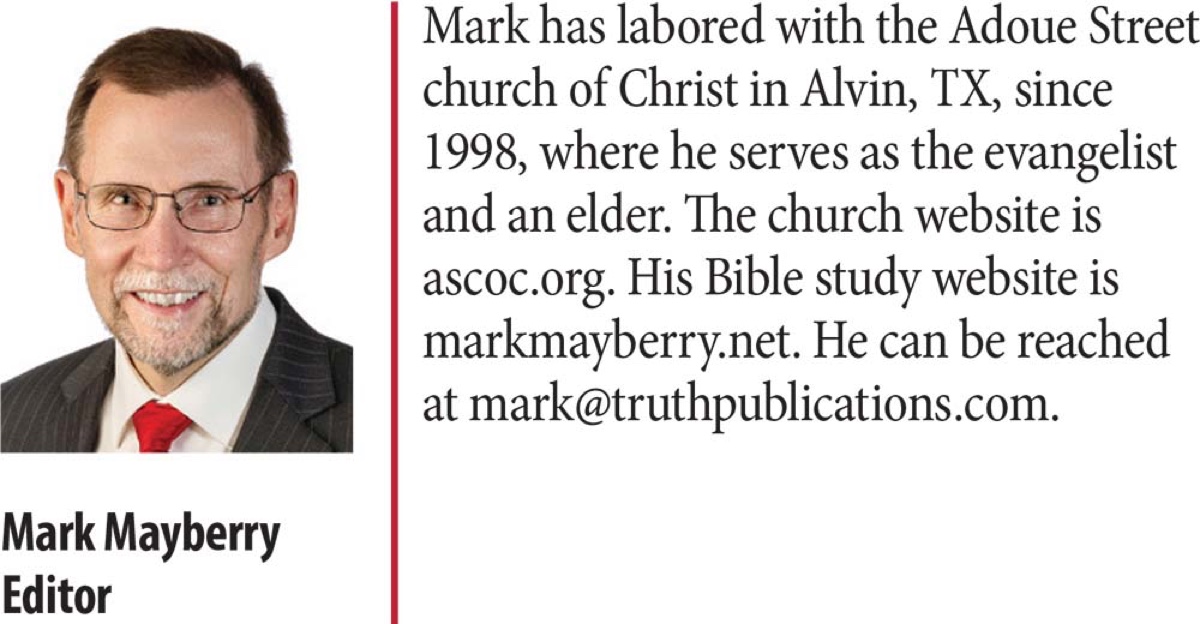
by Mark Mayberry
Synopsis: Christians are facing a renewed and intensified threat from the “woke” culture that seeks to impose its subjective definition of morality upon us all. Let us not compromise or remain silent, but resist and remain true to God’s word.
Jesus affirmed that God’s word is truth (John 17:13-21).
But now I come to You; and these things I speak in the world so that they may have My joy made full in themselves. I have given them Your word; and the world has hated them, because they are not of the world, even as I am not of the world. I do not ask You to take them out of the world, but to keep them from the evil one. They are not of the world, even as I am not of the world. Sanctify them in the truth; Your word is truth. As You sent Me into the world, I also have sent them into the world. For their sakes I sanctify Myself, that they themselves also may be sanctified in truth. I do not ask on behalf of these alone, but for those also who believe in Me through their word; that they may all be one; even as You, Father, are in Me and I in You, that they also may be in Us, so that the world may believe that You sent Me (John 17:13-21).
What is the nature of truth? Is it objective or subjective? Webster defines “objective” as “of, relating to, or being an object, phenomenon, or condition in the realm of sensible experience independent of individual thought and perceptible by all observers: having reality independent of the mind.” In contrast, “subjective” is “characteristic of or belonging to reality as perceived rather than as independent of mind.”
Isaiah exposed the folly of those who call good evil and evil good:
Woe to those who drag iniquity with the cords of falsehood, and sin as if with cart ropes; who say, “Let Him make speed, let Him hasten His work, that we may see it; and let the purpose of the Holy One of Israel draw near and come to pass, that we may know it!” Woe to those who call evil good, and good evil; who substitute darkness for light and light for darkness; who substitute bitter for sweet and sweet for bitter! (Isa. 5:18-20).
The Lord will cast down and consume those who justify the wicked and condemn the righteous (Prov. 17:15; Amos 5:6-7).
He who justifies the wicked and he who condemns the righteous, both of them alike are an abomination to the LORD (Prov. 17:15).
Seek the LORD that you may live, or He will break forth like a fire, O house of Joseph, and it will consume with none to quench it for Bethel, for those who turn justice into wormwood and cast righteousness down to the earth (Amos 5:6-7).
Jesus said, “I am the way, the truth, and the life, no one comes to the Father but through Me” (John 14:6). This was acknowledged, however grudgingly, by Jesus’s enemies (Matt. 22:15-22). The singularity of the gospel is reflected in its unifying principles (Eph. 4:1-6).
Therefore I, the prisoner of the Lord, implore you to walk in a manner worthy of the calling with which you have been called, with all humility and gentleness, with patience, showing tolerance for one another in love, being diligent to preserve the unity of the Spirit in the bond of peace. There is one body and one Spirit, just as also you were called in one hope of your calling; one Lord, one faith, one baptism, one God and Father of all who is over all and through all and in all (Eph. 4:1-6).
As a means of illustration and application, let us consider an article entitled, “The Ouroboros Moment,” by Abigail Mering, which appeared in the American Mind, a publication of the Claremont Institute. The ouroboros is an ancient symbol depicting a serpent eating its own tail. It entered Western tradition via ancient Egyptian iconography and the Greek magical tradition, Gnosticism and alchemy. The Greek word ouroboros is a compound of oura (tail) and boros (eating).
Abigail Mering, the article’s author, who is a student at Thomas Aquinas College, argues “Today’s official version of ‘progress’ is eating its own tail.” She’s right. Every erroneous and evil system of thought contains the seeds of its own destruction. This is also true of the ludicrously misnamed “Progressive Movement,” which is not progressive at all, but entirely regressive, i.e., rooted in the failed philosophies of the past. Illustrating the inconsistencies of wokeness, Ms. Mering says:
Jill over there with the Adam’s apple and the testosterone is not only trying to live by her (his) own subjective reality but is now trying to point a government gun at the rest of us and tell us to live by her subjective reality. Which would mean she doesn’t want her reality to be subjective anymore. If you took away that government gun, Jill would just be a guy who called himself Jill, and we’d all be okay with that so long as he doesn’t try and go near our daughters in public restrooms. Jill’s reality would be intact, or as intact as an insane reality can be, and my reality would not be infringed upon. I could call Jill he/him if I’d like, because that’s what I perceive Jill to be, and he shouldn’t be affected by that because he lives in his own reality anyway.
But that’s not enough, and that’s the problem many people have with the trans movement. It’s not a matter of “live and let live” anymore, but of forcibly altering our human identity into something else, something we’re supposed to trust the fanatics to forge and impose. Their lack of logic is more and more apparent as the movement grows. Gender is a scale, and male and female are the extremes, but there’s no such thing as gender-specificities. So there’s no outward way to distinguish male and female, but they do exist as the ends of the spectrum. Yet drag queens, generally men dressed as women, put on all of the stereotypical external feminine marks and mannerisms in order to signify that they are indeed imitating famous (biologically) female singers or film stars. They pull out the heels and false eyelashes and sequins to signify that they are trying to imitate femininity, because these things are engrained in all our minds as being more womanly. And then the movement expects us to give toy trucks to our baby girls because “how dare you say trucks are boy toys?” There are no rules other than to break the rules of human nature, and to kneel before whatever artifice is “next.”
In contrast with such madness, the biblical message is clear and consistent. God created humankind as biologically distinct, man/male and woman/female:
Then the LORD God said, “It is not good for the man to be alone; I will make him a helper suitable for him. . . So the LORD God caused a deep sleep to fall upon the man, and he slept; then He took one of his ribs and closed up the flesh at that place. The LORD God fashioned into a woman the rib which He had taken from the man, and brought her to the man. The man said,”This is now bone of my bones, and flesh of my flesh; she shall be called Woman, because she was taken out of Man.” For this reason a man shall leave his father and his mother, and be joined to his wife; and they shall become one flesh (Gen. 2:18-24).
The Hebrew word ish refers to a “man” (Thomas, 376). When occurring by itself, it always identifies one who is a biological male, and is never used of a biological female. In contrast, the word ishshah, translated “woman” and “wife” in vv. 23-24, refers to a “woman, wife, or female” (Thomas, 802). While it may identify women of different ages, occupations, marital status, and morality, it always refers to one who is a biological female, and is never used of a biological male.
Moreover, God reserved sexuality for the marital bond—which involves a loving and lifelong relationship between a biological man and woman (Gen. 2:23-24). Jesus Christ reaffirmed this essential truth (Matt. 19:3-6).
Outside the commitment/covenant of marriage, sexual expression is degrading and sinful (Prov. 5:15-23; Rom. 1:18-32; 1 Cor. 6:9-11). Furthermore, God intends men and women to be distinct in apparel and behavior (Deut. 22:5). As Paul begins his extensive discussion of spiritual gifts (1 Cor. 11-14), his instruction concerning the covering in chapter 11 is rooted in the inherent differences between males and females. This is seen in the respective roles of men and women in the home and the church (Eph. 5:22-33; 1 Tim. 2:9-15).
May we respect the role that divine revelation plays in our quest for spiritual understanding. Psalm 119 says, “Consider how I love Your precepts; revive me, O LORD, according to Your lovingkindness. The sum of Your word is truth, and every one of Your righteous ordinances is everlasting” (vv. 159-160). The inspired apostle said, “I am not ashamed of the gospel, for it is the power of God for salvation to everyone who believes, to the Jew first and also to the Greek. For in it the righteousness of God is revealed from faith to faith; as it is written, ‘BUT THE RIGHTEOUS man SHALL LIVE BY FAITH’” (Rom. 1:16-17).
The gospel is an external, objective standard that is received by revelation. As I grow, “the faith” becomes “my faith.” In other words, as we render submission to the gospel, each believer internalizes the principles and precepts of the gospel, so that God’s pattern guides our individual choices. Our subjective morality is based upon an objective standard. 
Mering, Abigail. “The Ourobouros Moment.” The American Mind (blog). October 13, 2021. https://americanmind.org/salvo/the-ouroboros-moment/.
Merriam-Webster’s Collegiate Dictionary. Springfield, MA: Merriam-Webster, 1996.
Thomas, Robert L. New American Standard Hebrew-Aramaic and Greek Dictionaries: Updated Edition. Anaheim: Foundation Publications, Inc., 1998.



